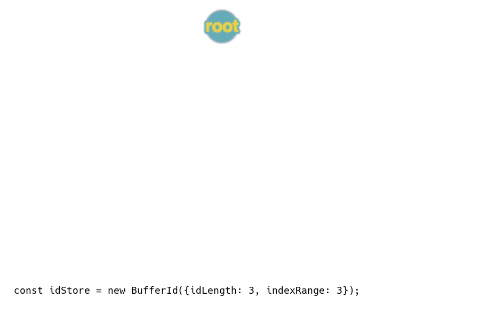buffer-id
v1.2.4
Published
Creates unique reusable identifiers as buffers or arrays
Downloads
16
Maintainers
Readme
buffer-id
Install
npm install buffer-idCreate unique and reusable identifiers as buffers or arrays.
Example ids created by this module:
[0,0,0](as buffer<00 00 00>)[0,1](as buffer<00 01>)[0,0,0,0,255](as buffer<00 00 00 00 ff>)
Use
Create store and pass some options to it. For example idStore with options:
- idLength = 3
- indexRange = 256
will be able to create ids of length 3 where first id will be [0,0,0] and last [255,255,255]. That gives 16777216 possible ids.
// Require module
const BufferId = require("buffer-id");
// Create idStore
const idStore = new BufferId({
idLength: 3,
indexRange: 256,
});
// Create id as array
const id = idStore.create(); // [0,0,0]
// Create another id
const id2 = idStore.create(); // [0,0,1]
// Remove id from idStore and release it
idStore.remove(id2);
// Create new id [0,0,1], since we released it in previous step
const id3 = idStore.create(); // [0,0,1]Options
idLength - length of id
| type | required | | ------ | -------- | | Number | true |
indexRange - specifies maximum values of each part of id
| type | required | default | | ------ | -------- | ------- | | Number | false | 256 |
Note that starting value is always 0, so range 256 will allow values form 0 to 255. If ids are intended to use as buffer there is no point setting indexRange greater than 256.
For example if idLength is set to 3:
- indexRange = 256 will produce ids from
[0,0,0](<00 00 00>as buffer) to[255,255,255](<ff ff ff>as buffer) (that gives 16777216 ids) - indexRange = 10 will produce ids from
[0,0,0](<00 00 00>as buffer) to[9,9,9](<09 09 09>as buffer) (that gives 1000 ids)
idFormat - default format of ids (can be array or buffer)
| type | required | default |
| -------------------------- | -------- | ------- |
| String [buffer|array] | false | array |
Methods
create
Creates new id. New id is either buffer or array (depends on store settings).
remove
Params:
| name | type | required | | ---- | --------------- | -------- | | id | array | buffer | true |
Removes id from store, so it can be reused.
Implementation
Tree is used as internal structure of idStore. Animation shows creating and removing id when idLength is 3 and indexRange is 3. Identifiers are from range [0,0,0] to [2,2,2].

Use case
This module can be used to create buffer ids which we can be sent to some service alongside with buffer message.
Lets say we have two microservices A and B, which can communicate using strings and buffers. Sending file from A to B could look like that:
- A to B: "I am about to send file named cat.jpg",
- B to A: "Ok, send it with id [0,0,0],
Then on the side of A:
// we have cat.jpg in variable named cat
const id = Buffer.from([0, 0, 0]); // creates <Buffer 00 00 00>
const msg = Buffer.concat([id, cat]); // Ads id just before cat- A to B:
<Buffer 00 00 00 ff d2 03 04 ... e5 06 0f 08> - B gets the message. Knowing that first 3 bytes is id it extracts cat from message and saves it as cat.jpg.
Test
AVA is used for testing. To run tests just type command:
npm run test
